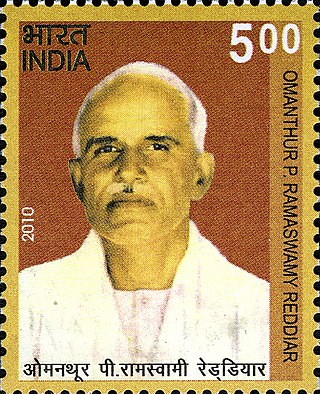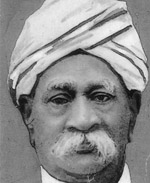Related Research Articles
The Justice Party, officially the South Indian Liberal Federation, was a political party in the Madras Presidency of British India. It was established on 20 November 1916 in Victoria Public Hall in Madras by Dr C. Natesa Mudaliar and co-founded by T. M. Nair, P. Theagaraya Chetty and Alamelu Mangai Thayarammal as a result of a series of non-Brahmin conferences and meetings in the presidency. Communal division between Brahmins and non-Brahmins began in the presidency during the late-19th and early-20th century, mainly due to caste prejudices and disproportionate Brahminical representation in government jobs. The Justice Party's foundation marked the culmination of several efforts to establish an organisation to represent the non-Brahmins in Madras and is seen as the start of the Dravidian Movement.

Seshadri Srinivasa Iyengar CIE, also seen as Sreenivasa Iyengar and Srinivasa Ayyangar, was an Indian lawyer, freedom-fighter and politician from the Indian National Congress. Iyengar was the Advocate-General of Madras Presidency from 1916 to 1920. He also served as a member of the bar council from 1912 to 1920, the law member of Madras Presidency from 1916 to 1920 and as the president of the madras province Swarajya Party faction of the Indian National Congress from 1923 to 1930. Srinivasa Iyengar was the son-in-law of renowned lawyer and first Indian Advocate-general of Madras, Sir Vembaukum Bhashyam Aiyangar. Iyengar's followers called him Lion of the South.

Paramasivan Subbarayan was an Indian politician, freedom fighter and diplomat and was the PrimeMinister of Madras Presidency, India's ambassador to Indonesia and Union Minister of Transport and Communications in Jawaharlal Nehru's government. He was the father of General P. P. Kumaramangalam, who served as India's Chief of Army staff, and of politician Mohan Kumaramangalam. He was also the grandfather of INC and BJP politician and Union Minister Rangarajan Kumaramangalam.
Raja Sri Ravu SvetachalapatiSir Ramakrishna Ranga RaoKCIE was an Indian politician and zamindar who served as the Prime Minister of Madras Presidency from 5 November 1932 to 4 April 1936 and 24 August 1936 to 1 April 1937.

Omandur Periyavalavu Ramasamy Reddiyar was an Indian freedom-fighter and politician of the Indian National Congress. He served as the Premier of Madras Presidency from 23 March 1947 to 6 April 1949.
Rao Bahadur Sir Kurma Venkatareddi NaiduKCSI was an Indian politician, lawyer, diplomat, and professor who served as the Prime Minister of Madras Presidency. He also served as the Governor of Madras Presidency — one of the only two Indians in history to have held the post. He was the only person to have held both the posts of Prime Minister and Governor of the Madras Presidency. As a prominent leader of the Justice Party, he formulated policies that promoted social equality, abolition of untouchability, and social reform. He also established the first women's college in Andhra region in Eluru.

Bollini Munuswamy Naidu was the Prime Minister of Madras Presidency from 27 October 1930 to 4 November 1932. He was conferred 'Rao Diwan Bahadur' by British Government.

Raja Sir Panaganti Ramarayaningar KCIE, also known as the Raja of Panagal, was a zamindar of Kalahasti, a Justice Party leader and the Prime Minister or Premier of Madras Presidency from 11 July 1921 to 3 December 1926.

John Francis Ashley Erskine, Lord Erskine GCSI, GCIE was a British soldier, Conservative Party politician and administrator who served as Member of Parliament (MP) for Weston-super-Mare and Brighton. Erskine also served as the governor of Madras Presidency from 1934 to 1940.
Diwan Bahadur Agaram Subbarayalu Reddiar was a landlord and Prime Minister or Premier of Madras Presidency from 17 December 1920 to 11 July 1921.
Rao Bahadur Sir Annepu Parasuramdas PatroKCIE was an Indian politician, zamindar and education minister in the erstwhile Madras Presidency.

Diwan Bahadur Sir Tinnevely Nelliappa Sivagnanam Pillai was an Indian lawyer, civil servant and politician from the Madras Presidency. He belonged to the Justice Party. He served as the Minister of Development in the government of the Raja of Panagal from 1923 to 1926.

Dr. C. Natesa Mudaliar (1875–1937), also known as Natesan, was an Indian politician and activist of the Dravidian Movement from what is now the Indian state of Tamil Nadu. He was one of the founders of the Justice Party, along with P. Theagaraya Chetty and Dr. T. M. Nair. He is often mentioned as Dravida Thanthai.

Sami Muthiah MudaliarCIE was an Indian politician and legislator of the Justice Party and later, the Swarajya Party and an independent minister in the Madras Presidency. He is largely remembered for introducing the Communal Government Order implementing reservations in the Presidency.

The second legislative assembly election for the Madras Presidency after the establishment of a bicameral legislature by the Government of India Act of 1935 was held in 1946. The election was held after 6 years of Governor's rule starting from 1939, when the Indian National Congress government of C. Rajagopalachari resigned protesting Indian involvement in World War II. This was the last election held in the presidency - after Indian independence in 1947, the presidency became the Madras state. The election was held simultaneously with that of the Legislative Council. The Congress swept the polls by winning 163 out of 215 seats. The years after this election saw factionalism in Madras Congress party with divisions across regional and communal lines. Competition among T. Prakasam, C. Rajagopalachari and K. Kamaraj resulted in the election of Prakasam as the Prime Minister initially. But he was later defeated by Omandur Ramaswamy Reddiar with Kamaraj's support. In turn, Reddiar himself was ousted to make way for P. S. Kumaraswamy Raja with the support of Kamaraj.

The first legislative council election to Madras Presidency after the establishment of dyarchical system of government by the Government of India Act 1919, was held in November 1920. Indian National Congress boycotted the election due to its participation in the Non-cooperation movement. The election occurred during the early stages of non-Brahmin movement and the major issue of the election was anti-Brahminism. Justice party won the election with no significant opposition and A. Subbarayalu Reddiar became the first Prime Minister of the presidency.

The third legislative council election to Madras Presidency after the establishment of dyarchical system of government by the Government of India Act, 1919, was held in November 1926. Justice party lost the election to Swaraj Party. However, as the Swaraja Party refused to form the Government, the Governor of Madras set up an independent government under the leadership of P. Subbarayan and with the support of nominated members.

The fourth legislative council election to Madras Presidency after the establishment of dyarchical system of government by the Government of India Act, 1919 in September 1930. Justice party won the election and P. Munuswamy Naidu became the first Prime Minister. The main opposition party - Swaraj Party did not contest the elections due to its participation in the Civil Disobedience Movement.

In the fifth legislative council election to Madras Presidency after the establishment of dyarchical system of government by the Government of India Act, 1919 the ruling Justice party lost the election and the opposition Swaraj Party emerged as the single largest party. However, it refused to form the government, due to its opposition to dyarchy. The incumbent Prime Minister, Raja of Bobbili retained power and formed a minority government.

Raja Sir Muttaiya Annamalai Muthiah Chettiar was an Indian banker, politician, philanthropist, socialite and cultural activist who served as Mayor of Madras city (1933) and Minister of Excise and Education (1936–37) in the provincial government of Madras Presidency. He was holder of the hereditary title Kumar-rajah (1929–48) and later, Raja of Chettinad (1948–84).
References
- The Who's who in Madras. Pearl Press. 1935. p. 58.
- Ralhan, O. P. (2002). Encyclopaedia of Political Parties. Anmol Publications PVT. LTD. ISBN 978-81-7488-865-5.